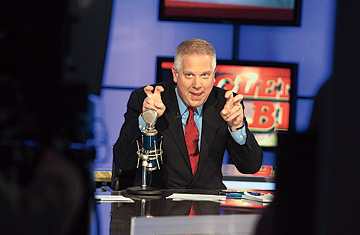
Glenn Beck
(7 of 7)
Extreme talk, especially as practiced by a genuine talent like Beck, squeezes maximum profit from a relatively small, deeply invested audience, selling essentially the same product in multiple forms. The more the host is criticized, the more committed the original audience becomes. And the more committed the audience, the bigger target it presents to the rant industry on the other side of the spectrum. A liberal group called Color of Change has organized an advertiser boycott of Beck's TV show--great publicity for the group and a boon to Beck's ratings.
If it's E pluribus unum you're looking for, try American Idol.
Mad as Hell
Starting after the election and continuing into spring, pollster Frank Luntz conducted a survey of some 6,400 Americans, and the first question was whether they agreed with this statement: "I'm mad as hell, and I'm not going to take it anymore." Nearly 3 out of 4--72%--said yes.
Movie buffs might appreciate this, because when Beck gets rolling on a particularly emotional riff, when the tears glisten and the shoulders shudder, Paddy Chayefsky, the great leftist playwright, looks like a prophet. He's the man who coined the phrase that, according to Luntz, is the rare thing Americans can agree on. He gave the line to Howard Beale, the mad anchorman at the center of the dark satire Network.
Chayefsky imagines cynical television executives who create a ratings sensation out of the nightly rants and ravings of Beale. The host energizes the nation with his cry, "I'm as mad as hell, and I'm not going to take this anymore!" It's hard to find a film that better captures the rotten vibe of the early 1970s, when America found itself suffering through one downer after another: failing companies, tense foreign relations, high unemployment, rampant incivility, spiraling deficits, corruption in high places, a seemingly endless war. Sound familiar?
Beck often cites Beale as an inspiration and a tribune for our own times. "I think that's the way people feel," he told an interviewer. "That's the way I feel"--like the fist-shaking, hair-pulling Beale. Whether channeled by a playwright on the left or a talk-show host on the right, anger and distrust can be dramatized and monetized. But do they ever really go anywhere?
The trouble with this prophecy is that we never find out what happens to the people watching Beale. Do they stay mad forever? Does their screaming ever lead to something better? Does the rage merely migrate, sending new audiences with new enemies to scream from more windows? And if the time comes when every audience is screaming, who, in the end, is left to listen?
A Day in the Life Of Glenn Beck
See behind-the-scenes photos of the TV and radio host at time.com/glennbeck
